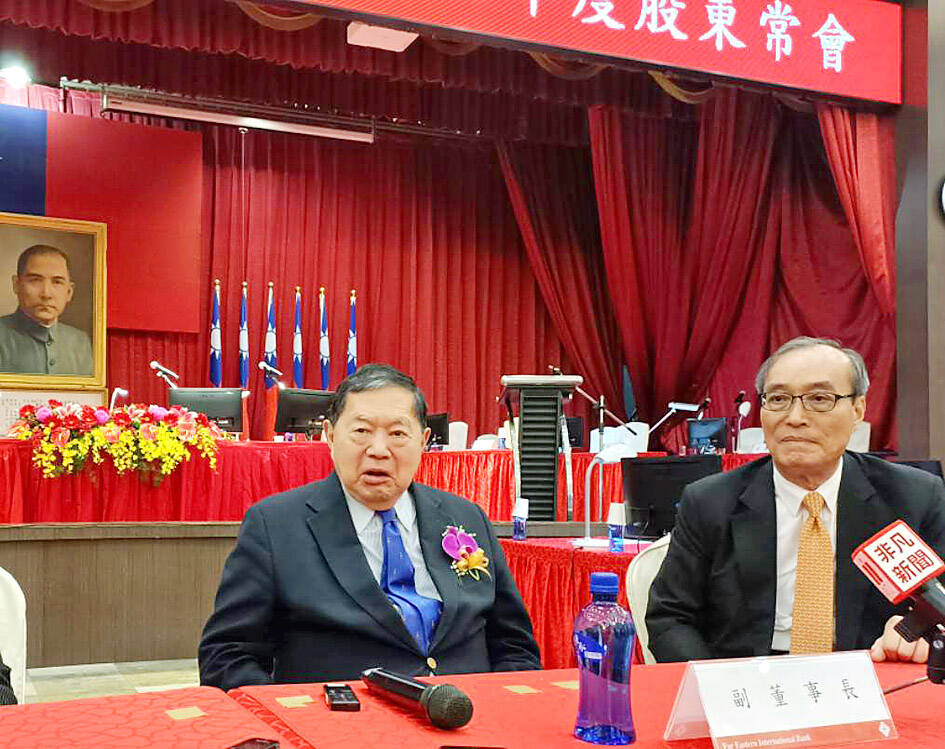Far Eastern International Bank (FEIB, 遠東國際商銀) yesterday said it is targeting loan growth of 4 percent this year, and has set a medium to long-term goal of transforming into a financial holding company.
The lender said it expects its financial performance this year to outpace average sector growth, driven by interest and fee income and investment gains.
The company discussed the goals during its annual general meeting, with shareholders approving plans to distribute a cash dividend of NT$0.506 and stock dividend of NT$0.506 per share, which translate into a payout ratio of 98 percent based on last year’s record income of NT$4.17 billion (US$128.87 million).

Photo: Lee Chin-hui, Taipei Times
“It is difficult to set a timetable for transforming into a financial holding company, as we have to seek merger and acquisition opportunities, which are beyond the bank’s control,” FEIB president Thomas Chou (周添財) told reporters.
The bank’s total assets last year rose 7 percent to NT$792.5 billion and it had a net worth of NT$58.9 billion, meeting the entry requirement of NT$750 billion for a financial conglomerate.
At the same time, its bad loan ratio declined to 0.108 percent, implying healthy assets.
Profitability gained momentum this year, with pretax profit in the first quarter surging 46 percent from a year earlier to NT$1.24 billion, company data showed.
FEIB attributed the profit improvement to less volatility in the bond market and investment gains.
Like its peers, the bank would press ahead with digital transformation and make online transactions its core operations, as technology reshapes the industry, Chou said.
Online savings accounts last year soared 78 percent and made up 2 percent of overall deposits, the bank said, adding that the proportion rose to 3.5 percent in March.
FEIB’s digital platform offers one-stop services and applications to facilitate deposits and lending, and enhance customer satisfaction, company representatives said.
Digital services aided the 24 percent rise in fee income in the first three months of this year from a year earlier.
The lender also places great importance on corporate banking and drove its cross-border syndicated loans to more than NT$77 billion last year, company officials said.
In other news, EnTie Bank (安泰銀行) shareholders yesterday approved a plan to distribute a cash dividend of NT$0.38 per share based on last year’s profit of NT$1.1 billion, or earnings per share of NT$0.56.
EnTie Bank said it took pride in boosting its green financing last year by 6.7 percent to NT$10.6 billion in support of efforts to address global warming.
It said it would seek to stay profitable and competitive for the rest of this year while meeting its social responsibility.

SELL-OFF: Investors expect tariff-driven volatility as the local boarse reopens today, while analysts say government support and solid fundamentals would steady sentiment Local investors are bracing for a sharp market downturn today as the nation’s financial markets resume trading following a two-day closure for national holidays before the weekend, with sentiment rattled by US President Donald Trump’s sweeping tariff announcement. Trump’s unveiling of new “reciprocal tariffs” on Wednesday triggered a sell-off in global markets, with the FTSE Taiwan Index Futures — a benchmark for Taiwanese equities traded in Singapore — tumbling 9.2 percent over the past two sessions. Meanwhile, the American depositary receipts (ADRs) of Taiwan Semiconductor Manufacturing Co (TSMC, 台積電), the most heavily weighted stock on the TAIEX, plunged 13.8 percent in

A wave of stop-loss selling and panic selling hit Taiwan's stock market at its opening today, with the weighted index plunging 2,086 points — a drop of more than 9.7 percent — marking the largest intraday point and percentage loss on record. The index bottomed out at 19,212.02, while futures were locked limit-down, with more than 1,000 stocks hitting their daily drop limit. Three heavyweight stocks — Taiwan Semiconductor Manufacturing Co (TSMC, 台積電), Hon Hai Precision Industry Co (Foxconn, 鴻海精密) and MediaTek (聯發科) — hit their limit-down prices as soon as the market opened, falling to NT$848 (US$25.54), NT$138.5 and NT$1,295 respectively. TSMC's

In a small town in Paraguay, a showdown is brewing between traditional producers of yerba mate, a bitter herbal tea popular across South America, and miners of a shinier treasure: gold. A rush for the precious metal is pitting mate growers and indigenous groups against the expanding operations of small-scale miners who, until recently, were their neighbors, not nemeses. “They [the miners] have destroyed everything... The canals, springs, swamps,” said Vidal Britez, president of the Yerba Mate Producers’ Association of the town of Paso Yobai, about 210km east of capital Asuncion. “You can see the pollution from the dead fish.

TARIFFS: The global ‘panic atmosphere remains strong,’ and foreign investors have continued to sell their holdings since the start of the year, the Ministry of Finance said The government yesterday authorized the activation of its NT$500 billion (US$15.15 billion) National Stabilization Fund (NSF) to prop up the local stock market after two days of sharp falls in reaction to US President Donald Trump’s new import tariffs. The Ministry of Finance said in a statement after the market close that the steering committee of the fund had been given the go-ahead to intervene in the market to bolster Taiwanese shares in a time of crisis. The fund has been authorized to use its assets “to carry out market stabilization tasks as appropriate to maintain the stability of Taiwan’s